In a White House meeting on April 10, 2025, U.S. Attorney General Pam Bondi reported to the president’s cabinet that, “you gave us a directive to prosecute the people who are going after Tesla to the fullest extent of the law. They’re all looking at 20 years in prison.”1 She was referring to Department of Justice property crime allegations against four unnamed Tesla Takedown protestors, and she hinted at future arrests.
Tesla Takedown is the nickname of the worldwide movement, begun in February of 2025, to boycott the Tesla automotive brand owned by Elon Musk. Protests associated with this boycott arose in response to Musk’s egregious attempts at domestic and international election interference, and the reckless gutting of federal government institutions by his Department of Government Efficiency (DOGE) team. Overwhelmingly, these protests are peaceful gatherings on public spaces such as sidewalks that are near but not within Tesla dealership property.
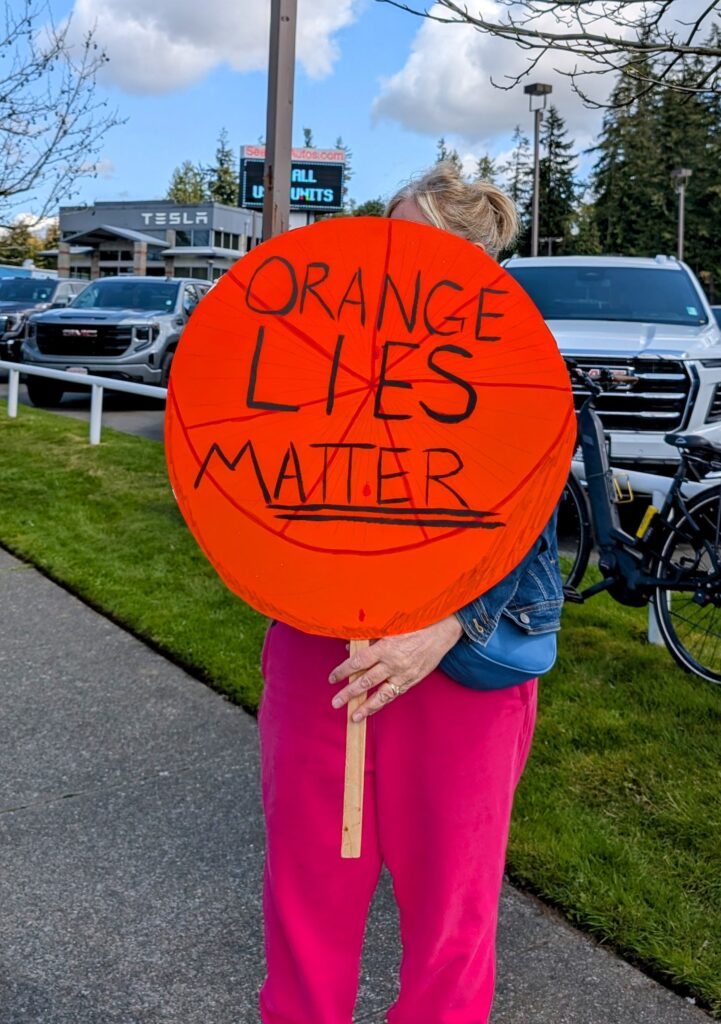
Violence, harassment, and other criminal behavior is not condoned in these volunteer-powered, grass-roots demonstrations, which mainly consist of a few hours of sign-carrying, flag waving, and chanting. The Federal Bureau of Investigation (FBI) reported in March that vandalism against Tesla vehicles in the United States has been spontaneous and isolated. Agency officials asserted that “these criminal actions appear to have been conducted by lone offenders, and all known incidents occurred at night. Individuals require little planning to use rudimentary tactics, such as improvised incendiary devices and firearms, and may perceive these attacks as victimless,”2 they said.
Both Trump and Bondi, however, are disseminating disinformation about leftist funding sources for Tesla property crimes. They are intentionally trying to exaggerate the boycott situation, equating all Tesla protestors with the handful of criminal outliers, without citing any concrete evidence. This move is yet another of his administration’s intimidation tactics aimed at quashing dissent. In a March statement that contradicted FBI reports, Bondi announced that she would “continue investigations that impose severe consequences on those involved in these attacks, including those operating behind the scenes to coordinate and fund these crimes.”3
On March 10, 2025, the day before his unethical advertising stunt on the South Lawn of the White House where he pledged to buy a Tesla and wasted countless tax dollars to shamelessly urge all of his supporters to follow suit, Trump went out of his way to disparage Tesla protestors and spread lies about them. He wrote, “the Radical Left Lunatics, as they often do, are trying to illegally and collusively boycott Tesla, one of the World’s great automakers, and Elon’s ‘baby,’ in order to attack and do harm to Elon, and everything he stands for.”4 Later in March, he gleefully announced his resolution to reclassifying Tesla vandalism as a terrorist offense. He threatened to deport offenders, whom he called “sick terrorist thugs”5 to El Salvadorean prisons. Horrifically, these unprecedented deportations to Trump-endorsed Central American penal colonies may occur regardless of citizenship status and without due process unless courts intervene.
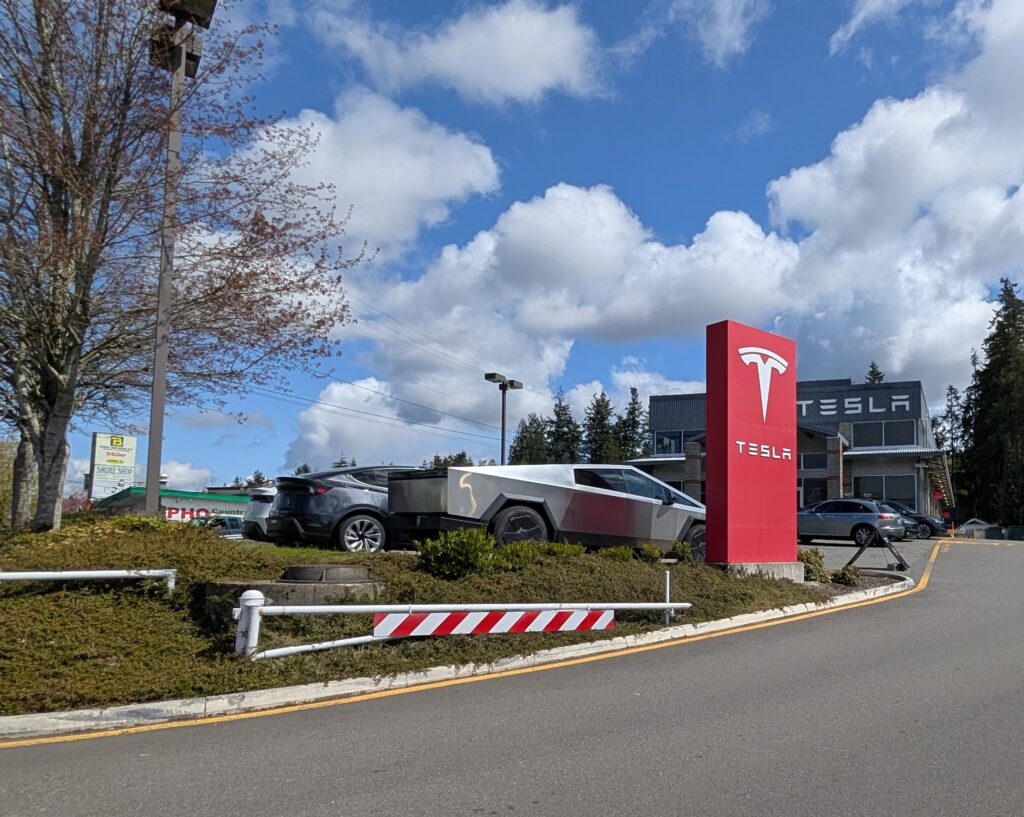
If a mandatory 20-year sentence at an international prison seems grossly disproportionate to vehicular damage and destruction, it is. Vehicle damage is not a federal crime. In Washington state, the sentencing for an intentional vehicular property crime would vary according to the degree and amount of the damage. The highest charge, a Class B Felony for 1st Degree Malicious Mischief, would carry a maximum sentence of 10 years in prison and a $20,000 fine.6
Boycotts are Rooted in Our Country’s History
Contrary to Trump’s remarks, boycotts are not illegal in the United States. Certainly, their legality is not subject to his or any president’s whims. Within the U.S. Constitution, the Bill of Rights guarantees all American citizens the freedom of speech and the right to peaceful assembly. Peaceful boycotts are associated with these two rights, and are therefore legal and protected activities.
In a democracy, boycotts are commonplace collective actions exerted by groups of citizens to put economic, social, and/or political pressure on the target of the boycott. Throughout our nation’s history, groups have boycotted people, businesses, and institutions to express their displeasure with unpopular policies and to call for change. For example, in the 1800s, “abolitionists organized boycotts of domestic and international companies that participated in the slave trade and supported slavery in the United States. Antifascist protesters boycotted Japanese silk during World War II. And, in the 1980s, human rights advocates organized a widespread and ultimately successful campaign to boycott apartheid South Africa.”7
Colonial boycotts involving commodities such as sugar, tea, and stamps pre-date the Revolutionary War and the founding of our nation. The 1773 Boston Tea Party, for instance, was one of the largest and earliest boycotts on U.S. soil. It was enacted by colonists in defiance of the Tea Act, which gave the British East India Company a monopoly on tea sales in the colonies and imposed steep tariffs (which amounted to a large colonial tax) upon it. Colonists therefore stopped buying British tea in favor of homegrown tea or Dutch imports. This led to an unwanted British tea surplus, and the destruction of shipments of British tea leaves, which were thrown into the Boston Harbor. “A second Boston Tea Party in March 1774 encouraged other tea-dumping demonstrations in Maryland, New York, and South Carolina.”7
As the boycott of the British East India Company hampered British tea sales in the colonial era, the Tesla Takedown has had a major economic impact on the Tesla car brand. Car sales have dropped precipitously since the boycott began, as have shares of Tesla stock. However, neither of these actions can be characterized solely as corporate boycotts. At its essence, the Boston Tea Party was a revolt against unfair taxation. Similarly, the Tesla boycott is a revolt against the grotesque executive branch overreach perpetrated by Trump and his allies like Musk. This is evidenced by the protest signage, the majority of which have pro-democracy and anti-oligarchy messaging.
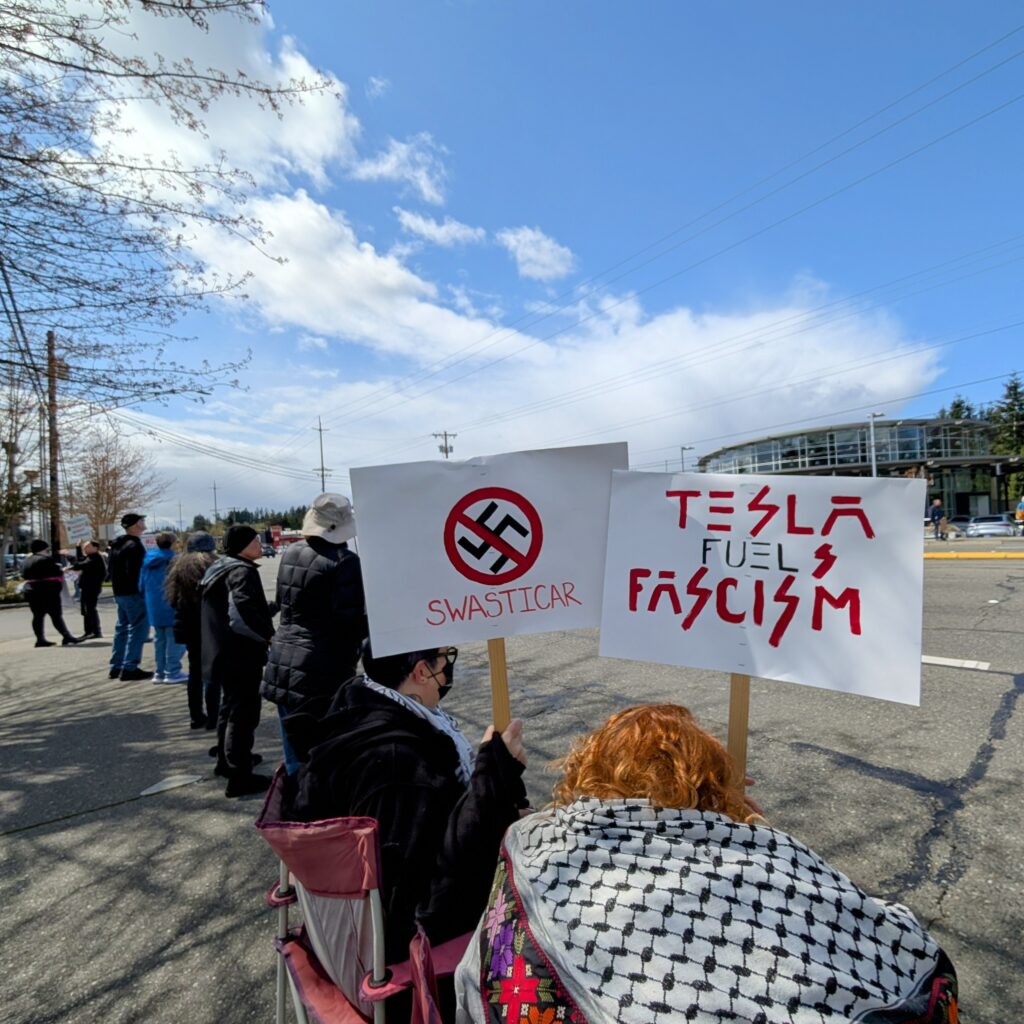
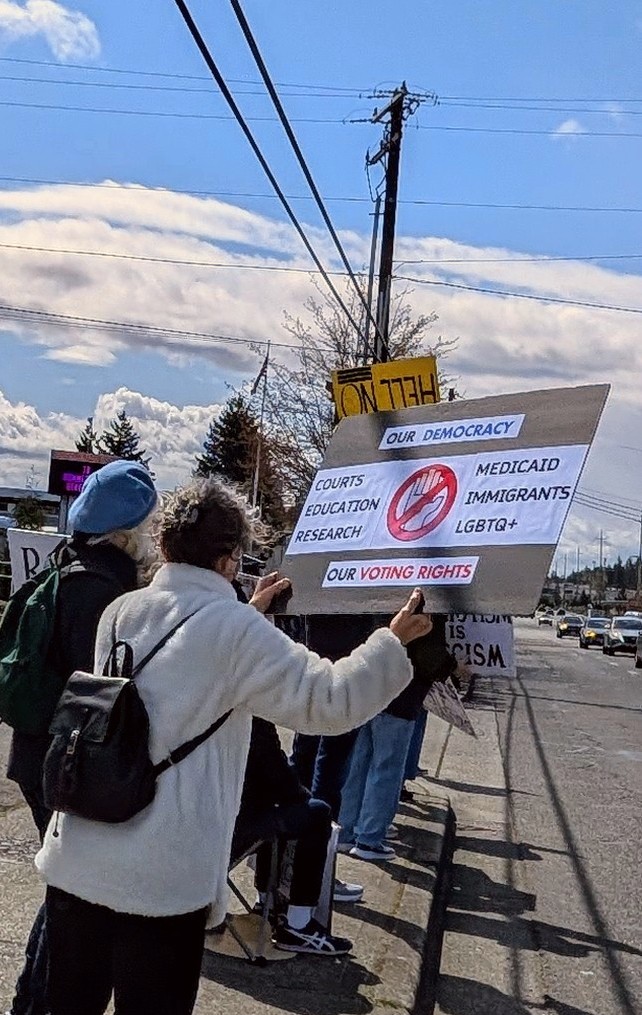
The ultimate goal of the Tesla Takedown, then, is to influence political action, rather than merely to inflict economic harm. People want billionaires, especially Musk, to stop taking away civil liberties and eliminating federal entities for power and personal gain. According to the Free Speech Center at Middle Tennessee State University (MTSU), “if a boycott is an attempt to influence political reform, it will likely be considered to be protected by the First Amendment.”8 Judicial precedents such as the 1982 Supreme Court ruling in NAACP vs. Claiborne Hardware Co. (regarding the boycott of a segregated business) support the constitutionality of the Tesla Takedown boycott.
Yet even this interpretation, proffered by MTSU law professor Dara E. Purvis, may be too narrow for organizations like the American Civil Liberties Union (ACLU), which believe that any anti-boycott legislation or ruling has the potential of limiting free speech and undermining the fundamental rights of citizens. Purvis’s more nuanced approach recognizes a “tension between the First Amendment rights of boycott organizers to convince others to join their campaign of petitioning for change, and antitrust and restraint of trade laws intended to prohibit harmful economic manipulation, such as price fixing or conspiratorial behavior.”9 The conspiratorial behavior that Purvis references is one of self-interest and personal gain by a boycotting group. It stems from the 1990 court case Federal Trade Commission v. Superior Court Trial Lawyers Association, in which lawyers staged a boycott to obtain a salary increase. The ACLU, however, contends that “the core principle of the First Amendment is that the government cannot dictate to its citizens which causes they can and can’t support.”10 The ACLU has been consistent in their calls for “hands off the right to boycott,” as emboldened far-right government officials attempt to pass laws that restrict them.
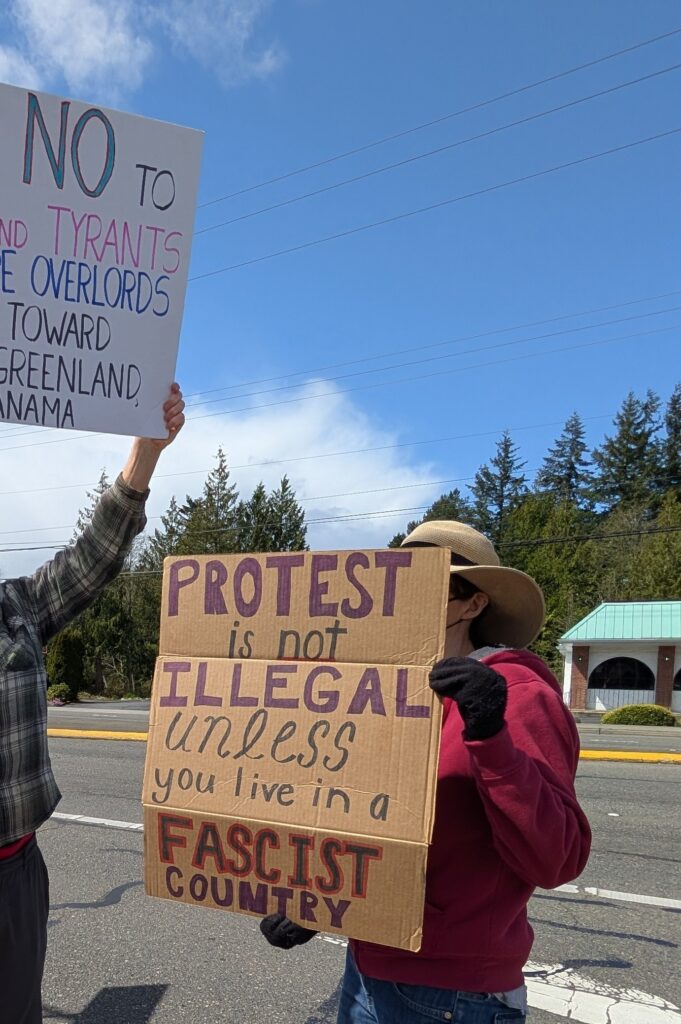
You Can’t Have it Both Ways
Trump and his supporters likewise would be culpable if boycotts were indeed illegal. Many presidents have called for diplomatic boycotts, but Trump is the first to routinely urge conservatives to boycott U.S. businesses. For ten years now, since his foray into presidential politics in 2015, he has consistently demanded that his supporters stop patronizing homegrown companies such as Macy’s, Nike, Apple, AT&T, Keurig, and Goodyear Tires for perceived slights against him and the Trump brand. Businesses have gone in and out of his favor, depending on their willingness to donate to his presidential campaigns or to capitulate to other Republican demands. Trump’s self-interested actions represent clear conflicts of interest unworthy of anyone aspiring towards or currently holding the presidential office.
In April of 2021, for example, Trump created a laundry list of corporations that he demanded conservatives boycott due to ideological differences. He said, “it is finally time for Republicans and Conservatives to fight back— we have more people than they do— by far! Boycott Major League Baseball, Coca-Cola, Delta Airlines, JPMorgan Chase, Viacom CBS, Citigroup, Cisco, UPS and Merck. Don’t go back to their products until they relent. We can play a better game than them.”11 Though he touts the “America First” slogan, Trump seems to regard using the consumer power of his base against American corporations as a game; a fair game, that is, only if his party is the one initiating the boycott.
Currently, far-right Republicans are boycotting TV shows such as Saturday Night Live and corporations such as Starbucks coffee. The latter boycott is a reaction to a viral video made by Starbucks union members on April 1, 2025 in a show of solidarity for their fellow employees who were being threatened and detained by the Trump administration. Workers “halted a few minutes of their services across the nation as a form of protest against the recent illegal deportation of immigrants.”12 The Starbucks boycott, then, is a counter-protest by Trump supporters who condone unlawful, politically-motivated deportations, all without due process, and want them to continue.
People Power vs. Corporate Control
Meanwhile, anti-Trump groups are boycotting more than just Tesla. Amazon, Target, Walmart, and Facebook are just a few other companies that democratic-leaning individuals are avoiding because they have supported the Trump administration financially or have complied with unpopular policies such as those against diversity and inclusion. In early March, “the non-partisan, grassroots People’s Union USA explained democratic boycott strategy by saying that “our strength lies in economic power. If corporations control politicians through money, then we control corporations by withholding ours. Targeted boycotts, economic blackouts, and financial pressure will make them listen.”13
The Tesla Takedown protest on the Mukilteo Speedway in Lynnwood, WA on April 12, 2025 was one of at least a half a dozen similar protests at Tesla dealerships that were announced on social media in the Greater Seattle area that weekend. Attendees at the speedway location have been regularly protesting there since DOGE began mass layoffs at government offices. Over 100 people showed up at the busy motorway on that balmy Saturday afternoon. Most of them were middle aged and older. Some admitted that their protest gear–political t-shirts, pink pussy hats, and flags–were items they had worn or carried in marches and protests during Trump’s first administration.
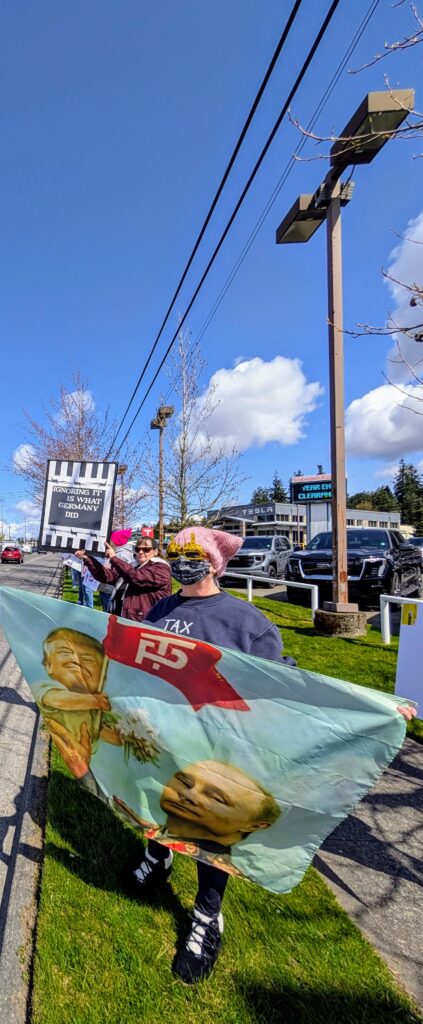
Everyone seemed to agree, however, that the situation today is more dire than it was back in 2016. Attendees expressed shock at the rapidity of the country’s descent into authoritarian rule by oligarchs like Elon Musk. They fear for future generations. A unifying resolve among them was the desire to not be complicit in Trump’s cruel and anti-democratic policies. Taking a stance through protests, consumer boycotts, and appeals to politicians, has been an important outlet for their present anti-Trump outrage.
Many motorists on the heavily trafficked speedway honked or waved in support of the Tesla protestors. Other simply ignored them. One driver hurled obscenities out the window and accused attendees of being paid to be there by liberal investor and philanthropist George Soros. The far-right conspiracy theory that billionaire Soros pays all anti-Trump protestors has been circulating since Trump first held office. It is a demeaning projection, because Trump allies like Musk have had to pay for Republican votes and petitions. The simple truth is that far-right narcissists perceive everything as transactional, meaning they always look for how they will benefit in a situation. They cannot comprehend that Tesla Takedown protestors are not motivated by personal gain; they are engaging in political action voluntarily because they are angry about what is happening to our country!
Another motorist in the turn lane closest to the sidewalk sped up when he saw protestors, and greatly exceeded the speed limit. It was evident that this driver intended to intimidate protestors and even clip them as he sped past them if he was able. The long line of protestors jumped backwards, as if in a wave, reacting to the real possibility of being hit by the driver. After this incident, attendees shared ideas for being safe during protests, which is a real concern in Trump’s America even in a blue state like Washington.
Americans have been boycotting businesses since they were British colonists. Consumer boycotts are a legal and necessary populist check on corporate culture. They remind businesses and other entities that their role is to innovate in ways that serve the best interests of their customers. Consumers who participate in boycotts assert their agency by aligning their spending habits with their cultural or political values. This is an astute way for citizens to modify their consumer habits even when not participating in a mass boycott movement.

Works Cited:
- Theo Burman, “Pam Bondi Teases Huge Arrest Over Tesla Attacks,” Newsweek, April 11, 2025, https://www.newsweek.com/pam-bondi-tesla-protest-arrest-elon-musk-2058422.
- Burman, 2025.
- Shane Croucher, “Trump Touts Prison in El Salvador for Tesla Attackers,” March 21, 2025, https://www.newsweek.com/trump-touts-prison-el-salvador-tesla-attackers-2048498.
- Croucher, 2025
- Croucher, 2025.
- “Mount Vernon Vandalism: Understanding Malicious Mischief in Washington,” Washington State Attorneys, last accessed April 15, 2025, https://www.washingtonstateattorneys.com/mount-vernon-vandalism-understanding-malicious-mischief-in-washi.html.
- “In Congress, A Threat to Americans’ Right to Boycott,” ACLU, January 28, 2019, https://www.aclu.org/news/free-speech/congress-threat-americans-first-amendment-right-boycott.
- “Boston Tea Party,” History.com, last updated February 27, 2025, https://www.history.com/articles/boston-tea-party.
- Dara E. Purvis, “Boycotts,” Free Speech Center at Middle Tennessee State University, last updated July 5, 2024, https://firstamendment.mtsu.edu/article/boycotts/
- ACLU, 2019.
- Jordan Williams, “Trump Calls for Republicans to Boycott Companies Amid Voting Law,” The Hill, April 4, 2021, https://thehill.com/homenews/state-watch/546349-trump-calls-for-sweeping-boycott-of-companies-protesting-georgia-voting/.
- “‘Boycott Starbucks’ is Trending on X: Maga Activists Big Call Ater Coffee Chain Stopped Services Across U.S.” The Economic Times, April 13, 2025, https://www.msn.com/en-in/money/general/boycott-starbucks-is-trending-on-x-maga-activists-big-call-after-coffee-chain-stopped-services-across-us/ar-AA1COULE?ocid=BingNewsSerp.
- Garritt C. Van Dyk, “Consumer Resistance is Rising in the Age of Trump: History Shows How Boycotts Can Be Effective,” The Conversation, March 5, 2025, https://theconversation.com/consumer-resistance-is-rising-in-the-age-of-trump-history-shows-how-boycotts-can-be-effective-251448.